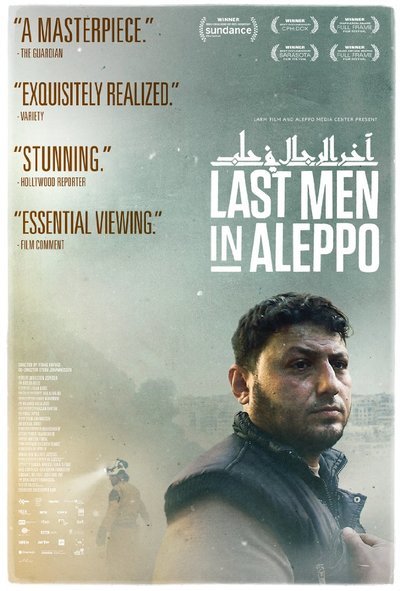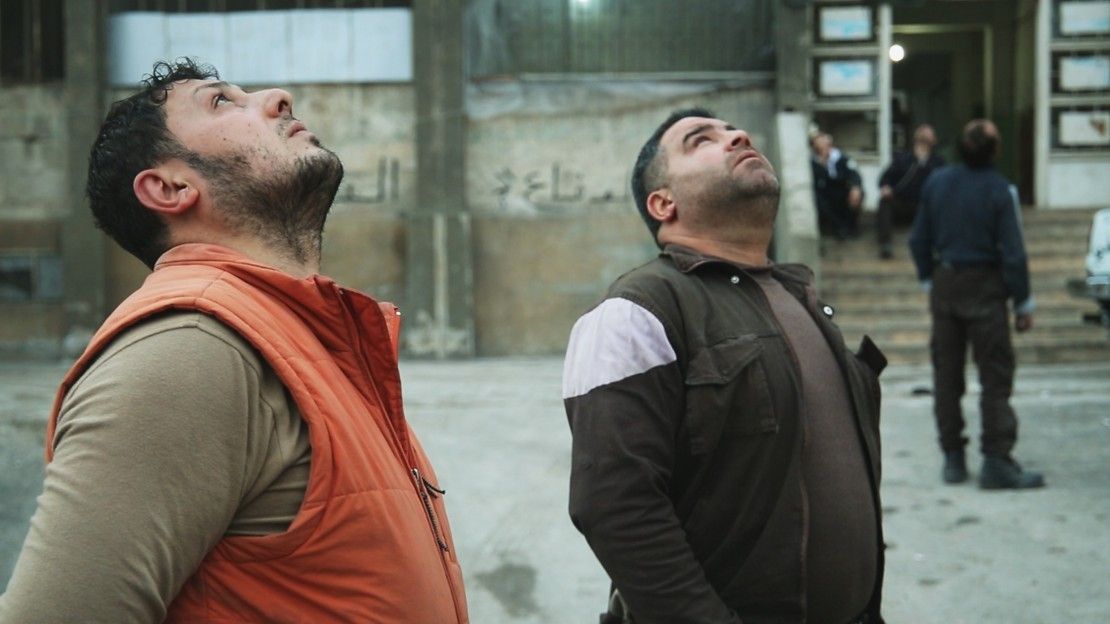LAST MEN IN ALEPPO
"And what is Aleppo?", former Libertarian Party presidential candidate Gary Johnson infamously asked on MSNBC's Morning Joe. The former New Mexico governor and marijuana enthusiast was clearly befuddled by the question about what to do regarding 'Aleppo', and had to have Aleppo explained to him.
Khaled Omar Harrah would know what 'Aleppo' is. The primary subject in Last Men in Aleppo, his story, along with that of his fellow Syrian Civil Defence, better known as White Helmets, who go towards the bombed-out areas of his besieged city to rescue any survivors. Last Men in Aleppo is their story.
Khaled, along with other White Helmets like Mahmoud and his brother Ahmad, live their lives the best they can inside this damned and probably doomed city. They endure the daily bombings from Russian planes, the lack of medicine, but within the horrors of war: the dead babies, the constant knowledge that death is possible by sunset, they continue.
The White Helmets relish every small victory: any person found alive, a visit to a playground with their children where for a brief respite, the greatest concern is the loss of a balloon, even a wedding where for a few minutes the men can dance before getting a call to rush to another devastated building. In the midst of all this death, with Bashar Assad still firmly in power and the Syrian people slowly strangled, the last men in Aleppo continue to protest, defiant to the bitter end.
The end is quite bitter for Khaled, for on August 11, 2016, he is killed in the city he loved and did not leave by one of those bombs, his friend Nagieb trapped alive with him in his last two hours. Khaled is buried at night, one less man in Aleppo.
Last Men in Aleppo at times seems almost a bit too thought out, something that even Mahmoud touches on. He is brought to visit the home of one of the children he has rescued, offered coffee while the child asks, 'How did you get us out?' After leaving, Mahmoud expresses his discomfort at it all. "It felt like were there to show off," he says, clearly ill at ease.
I think I need to be as detailed as I can when I say 'too thought out'. I am not saying by any means that anything in Last Men in Aleppo is somehow staged, rehearsed or fake. I am, however, wondering if almost all the conversations that the men had really did revolve around the conversations seen. I could never shake the idea that the White Helmets knew their story would be seen by the uncaring outside world and thus, would circle back to the same topics.
That was not necessary, as the evil of Assad and his protector Vladimir Putin comes loud and clear every time we see a dead baby pulled from the rubble. Images like these are not shied away from, nor should they. The horror and barbarism of the Syrian Revolution (I will not call it a 'civil war', for the whole reason for the uprising was the fall of the Assad regime, which the men in Aleppo continue to call for) should be seen, should be felt, should be something we should not look away from.
The film is hard to watch, especially whenever the White Helmets rush towards the newest bombing, the panic, horror, and chaos of the situation brought vividly by director Firas Fayyad. They were wise to put in little moments of the semblance of normalcy, such as when Khaled put in new fish in a fountain freshly baptized with water.
We also don't see them as supermen. While we know that the White Helmets were civilians with regular jobs prior to the Revolution (Khaled a painter and designer, Mahmoud a student), we also see that they are men with doubts and fears. Khaled at an anti-Assad rally approaches a human smuggler and talks about how he might want to send his family to safety in Turkey, which the smuggler says is now nearly impossible. Later on though, Khaled tells Mahmoud that his family will not leave because he will not leave his beloved Aleppo.
In their hearts, every White Helmet knows that they are almost doomed to die. "The siege is our destiny," Mahmoud ruefully remarks. They, however, even with their fear, their anxieties for their families: Khaled's wife and two daughters, Mahmoud for his brother, continue.
It is almost as if we know by the end that Khaled will not live to see a free Syria. We last see him alive, looking at a phone message from his daughter, then see Nagieb in shock and Khaled on the slab, being washed. To see the man most featured in Last Men in Aleppo dead should hit us the most, the acknowledgment that these men are no more, while the world did nothing.
I'm convinced that history will damn us for doing nothing in Syria. Last Men in Aleppo is the dead speaking to us, their testimony to a collective indifference. The film gives us no solutions, just a chronicle of a city in its last days, and the men who knew it and knew they were not going to get out alive, but stayed.
DECISION: B+



No comments:
Post a Comment
Views are always welcome, but I would ask that no vulgarity be used. Any posts that contain foul language or are bigoted in any way will not be posted.
Thank you.